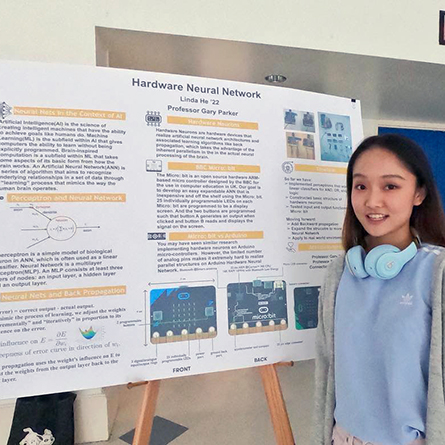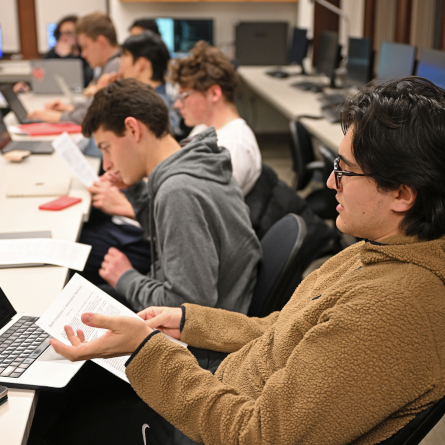
Students present their summer science research at poster symposium
After spending eight weeks on campus this summer conducting funded neuroscience research as part of Conn’s Summer Science Institute, Anjum Shaikh ’22 had an opportunity to share her work with the entire campus community.
On Oct. 5, Shaikh and 41 other summer research students participated in the annual poster symposium that represents the culmination of the Summer Science program, an intensive collaboration between a small cohort of students and 20 faculty from across the science and math departments. Students accepted into the program receive a $4000 stipend and free campus housing.
Shaikh’s work used electroencephalography (EEG) technology to develop an alert system that is capable of monitoring neurons in the brain to detect when the mind begins to wander—something that could prove lifesaving in a variety of scenarios.
“This type of research is incredibly important when it comes to any task requiring sustained attention that can be a bit boring, such as an everyday activity like driving,” Shaikh explained.
“But it can also apply to people who have jobs that are typically quite repetitive, like TSA agents who screen luggage for weapons, or radiologists who examine X-rays for signs of tissue abnormalities. It’s crucial for these types of professionals to remain focused, as slip-ups could be dangerous,” she added.
The Summer Science Institute takes a unique approach in that it offers students rare opportunities to conduct advanced research with faculty and to even be published, or present their findings at professional conferences as early as the summer after their first year.
Throughout the eight-week period, students work to hone their presentation skills by delivering updates on their progress in weekly colloquia with their fellow summer science participants.
The poster symposium is an essential component of the program, as it invites all members of the Conn community to learn about the work the students did over the summer.
“It's so important for science students to develop great communication skills and to be able to clearly articulate the work they've accomplished,” said Emily Tarsis, lecturer in chemistry and coordinator of the 2019 Summer Science Research Institute. “Sharing their work via poster presentations gives students the opportunity to practice communicating to a broad audience and challenges them to think about different ways to explain their research to people with various levels of scientific training.”
Grace Kovic ’21, who has participated in the Summer Science program the past two years, worked with Assistant Professor of Chemistry Jacob Stewart on his current research analyzing the gas Isoprene using Infrared Laser Spectroscopy. Isoprene is a key gas found in the Earth’s atmosphere and plays an important role in the production of ozone and other gases related to climate warming. Levels of the gas in a person’s breath may be linked to medical conditions as well, such as lung cancer.
“It’s been a huge privilege as an undergraduate student to work so closely with professors while also being able to work independently and design new experiments to support their current research,” Kovic said.
She added that the experience over the summer, along with her presentation at the poster symposium, have built her confidence and developed her research, communication and lab skills.
“I learned more than I ever imagined I would during those few short weeks, but I also had a lot of fun,” Kovic said. “Spending summer days with a group of students and professors who share my scientific interests was great, and being able to share our work at the symposium this fall was extremely gratifying.”

